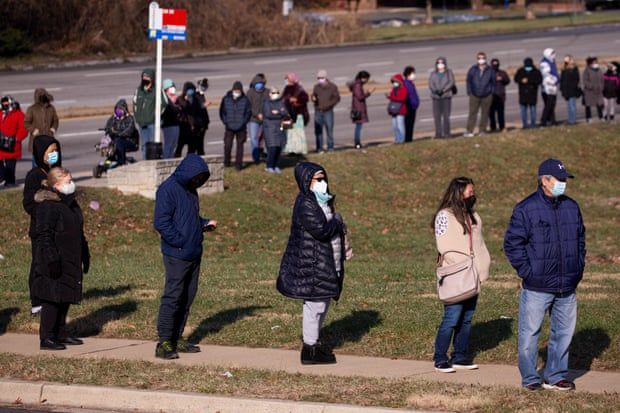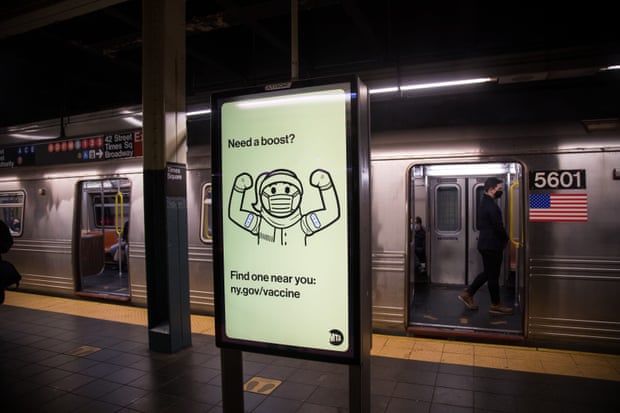
‘I have no intention of getting infected’: understanding Omicron’s severity
Leaders in the US have struck a pessimistic tone about the Covid-19 pandemic in recent weeks amid rapid spread of the Omicron variant.
Janet Woodcock, acting commissioner of the US Food and Drug Administration, recently testified before Congress that “most people are going to get Covid”. Dr Anthony Fauci, chief medical adviser to Joe Biden, has also said that Omicron “will ultimately find just about everybody” in terms of exposure, though vaccines make an important difference in who develops the illness.
But Covid-19 is still a very serious disease with unknown outcomes, even for the less severe Omicron variant.
Here top experts break down exactly why people should still try to avoid getting Covid-19 – especially in the next few weeks and months, as hospitals see unprecedented strain and effective early treatments are appearing on the horizon.
Am I just going to get Covid no matter what I do?
“That’s not true,” said Paul Offit, a professor of pediatrics in the division of infectious diseases at Children’s Hospital of Philadelphia. “I don’t plan on getting infected with Omicron. I’m vaccinated; because I’m over 65, I’m boosted. I wear a mask whenever I’m in public and indoors around people I don’t know. And I have no intentions of being infected with this virus.”
While the more transmissible Omicron variant is infecting more people than ever before, taking proven precautions can still prevent it: getting vaccinated and boosted, wearing high-quality masks, improving ventilation and avoiding crowds indoors.
Should I just get it and get it over with?
Planning to get Omicron in order to gain some immunity or get it over with is a terrible idea, said Eric Topol, a professor of molecular medicine at Scripps Research. “This is a real-deal virus where there’s unpredictability,” he said. “Some people can get very sick. Some people can get long Covid. Some people unwittingly will then get immunocompromised people sick”, leading to hospitalization and death.
He added: “There’s too many liabilities, too many uncertainties and unpredictabilities when you get a virus with this known profile that can be very severe and lethal still.”
And it’s not at all clear if recovering from Omicron would protect against future variants.
If you’ve already gotten Omicron, it may have broadened your T-cell recognition and your B-cell memory and given you “a nice jolt of neutralizing antibodies”, Topol said. But “you can’t possibly make that assertion that Omicron will protect from the future”.
But isn’t Omicron mild?
Definitely not a guarantee. It is still a deadly illness.
Omicon is less severe than Delta – but Delta was itself more severe than previous variants.
“It can still be severe,” Topol said. He calls it less severe, not milder. “‘Milder’ caught on early, and I think it’s unfortunate it’s given this impression, because there’s so many people dying and winding up in the ICU.”
Advertisement
In animal studies, Omicron was less effective than Delta at infecting lung tissue, making severe pneumonia less likely. And according to a new preprint study, which has not been published or peer reviewed, illness was shorter and hospitalizations were half as likely among those with Omicron versus Delta.
But a lowered risk of getting very ill doesn’t mean no risk, Offit said. “You still could have all of those things happen to you – you still could be hospitalized, go to the ICU, require mechanical ventilation and die.”
Is that why some people are still being hospitalized?
The US has record-high hospitalizations, and cases are more than three times higher than our previous highest peak, a year ago.
That’s because the other characteristics of Omicron – its immune-evasiveness and transmissibility – more than outweigh its relatively less severe symptoms. When more people get sick, there are more chances of the illness going very wrong.
“A small percentage of a huge number is a very large number,” said Jorge Moreno, assistant professor of medicine at the Yale School of Medicine.
Jerome Adams, the former US surgeon general, laid out the math: “If your enemy uses a weapon that’s one-third as likely to kill you, but four times as many people are shooting at you, you’re now 1.3 times as likely to die!”
 People wait in a long line for free Covid-19 at-home antigen rapid tests at a library in Silver Spring, Maryland, on Friday.
People wait in a long line for free Covid-19 at-home antigen rapid tests at a library in Silver Spring, Maryland, on Friday.
What about this idea of being hospitalized “for” versus “with” Covid?
“I think that’s grossly inaccurate,” Topol said. He recently cared for a Covid-positive patient with chronic lung disease who was coded as hospitalized “with”, not “for,” Covid. That’s because the patient needed to be treated for the lung disease – but it had only flared up because of Covid.
“We do have 150,000 US hospitalizations with or for Covid, which is well beyond any record and is completely overwhelming health systems,” Topol said. “So, this debate is just nonsensical.”
There are cases where patients are undergoing surgery or getting treated for accidents when they test positive for Covid incidentally. But that’s not very common, experts said.
It’s far more likely that Covid exacerbates another condition or causes a different illness to rise to the forefront: complications from diabetes, renal failure, strokes, heart inflammation or failure, asthma, emphysema, pulmonary embolisms.
Does that mean the types of complications caused by Covid are changing?
“This virus does things no other respiratory virus does,” Offit said. “You can have strokes, heart attacks, kidney disease, liver disease, and then whatever long Covid is.”
Previous variants also created these types of complications. The difference with Omicron is, you might not need to be ventilated – but you’ll still need to be hospitalized, sometimes in the intensive care unit.
“It may be causing a milder pulmonary problem, but it’s definitely still causing other problems,” Moreno said. “They may not require intubation; they may still require the ICU.”
One major complication from Covid has been diabetic ketoacidosis. “It raises their blood sugars; it creates conditions that are more threatening for patients with diabetes,” Moreno said.
“Those are very urgent and sometimes life-threatening conditions. They still require a lot of care. They still require a lot of time in the hospital.”
What’s Omicron doing to hospitals?
“The end result is our hospitals are filling up,” Topol said. “And it’s breaking the backs of the healthcare system, particularly the healthcare workforce.”
Across the country, hospitals are nearing or passing capacity. On Thursday, Joe Biden promised to send the military to six states where hospitals are overwhelmed.
There were already staff shortages due to death, disability, and the emotional burdens of the pandemic. Now, more health workers are out sick with Omicron.
“On top of that, we are adding the fact that the US is not closed. Back in March of 2020, everything was closed,” Moreno said. That meant there were fewer accidents happening and fewer infectious diseases spreading.
“Last year, there was no flu, there was no RSV,” Offit said. “What we did by not just masking and social distancing, but by closing schools, closing businesses, restricting travel – we dramatically reduced the incidence of those diseases.”
Now, hospitals are facing Covid plus other health emergencies, Moreno said. “It’s a perfect storm.”
 ‘You never ever want to get a viral infection,’ Offit says. ‘But the good news is, you don’t have to.’
‘You never ever want to get a viral infection,’ Offit says. ‘But the good news is, you don’t have to.’
Do vaccines still help against Omicron?
Absolutely. Unvaccinated people in particular are still at risk for pneumonia and other complications, and vaccinations can dramatically lower those risks.
“If you’re unvaccinated, you will have a longer illness, you will get sicker most likely,” Moreno said. “There is some evidence that it’s not targeting the lungs as much – however, one thing with Covid is that it can do whatever it wants, right? So once it finds the host, once it gets in, it’s unpredictable.”
But vaccination, he said, “makes Covid predictable”.
“You never ever want to get a viral infection,” Offit said. “But the good news is, you don’t have to. You can vaccinate yourself so you can experience the immunity induced by natural infection without having to pay the price of natural infection.”
Sometimes it feels like each wave will last for ever. But are things getting better?
“I do think that we are on the verge of getting past at least the bulk of Omicron,” Offit said. “You will start to see a decline.”
And new treatments that are very effective at keeping Covid from getting serious are on their way. It takes time to manufacture them, but within months, the US should have millions of doses – which means getting infected with Covid in a few months could be much less risky with more tools to battle it.











